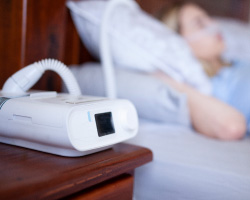
April 10, 2023—Sleep apnea can lead to serious health problems, including heart and blood pressure problems. So if your doctor has prescribed a CPAP, BiPAP or similar device to treat your sleep apnea, it's important to stick with it. But sleeping with a CPAP can be a big adjustment for many people. Here's how to make the transition easier.
Stick with your CPAP
Using your CPAP regularly can help prevent or even reverse your risk of heart disease and strokes caused by sleep apnea.
Yes, these devices may take some getting used to, but most people adapt after a few months. These six tips can help.
Choose the right mask. Some styles cover your nose or your nose and mouth. Others use nasal pillows, which fit into your nostrils. If you breathe through your mouth, a nose-and-mouth mask may be best. Consider your sleeping style, and talk to your doctor about which option might be best for you.
Make sure your mask fits correctly. Whichever style you choose, make sure your mask has a snug seal. This will maintain the right amount of air pressure to keep your airways open all night long. Tighten the straps just enough to get a good seal. This will prevent rubbing and chafing.
Ease into it. Getting used to having something on your face while you sleep can be challenging. Try wearing your mask for a few minutes at a time during the day while watching television or reading. Doing so will associate the mask with a pleasant activity and help distract you, making wearing it feel more natural.
Ramp it up. Some machines offer a ramp feature that starts out with lower pressure when you're falling asleep and builds it over the course of the night. That way, the air pressure is less noticeable when you're falling asleep.
Use a CPAP with a humidifier setting. These deliver cool or warm air through your mask. They help to reduce nasal irritation and make breathing easier.
Treat a dry, stuffy or blocked nose. Try using a nasal gel or saline spray. Get your doctor's advice for medicines if you are sneezing, coughing or have a runny nose.
Still have problems? Talk to your healthcare provider about what works and what doesn't. Sometimes you need to try different solutions to find the right one.
With so many benefits of a good night's sleep—lowered blood pressure, better daytime concentration and productivity, and more energy, among others—treating sleep apnea is a real win-win. Discover more ways to get healthy sleep in our Sleep health topic center.
Sources
- American Academy of Family Physicians. "CPAP Devices for Sleep Apnea." https://familydoctor.org/cpap-devices-for-sleep-apnea.
- American Academy of Sleep Medicine. "What Is CPAP Therapy?" https://sleepeducation.org/patients/cpap/.
- American Sleep Apnea Association. "CPAP Machines." https://www.sleepapnea.org/cpap.
- SleepApnea.org. "Troubleshooting Guide for CPAP Problems." https://www.sleepapnea.org/cpap/troubleshooting-cpap-problems.